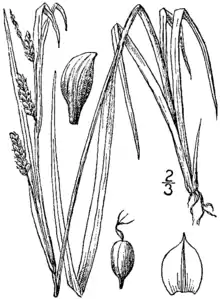Carex blanda
Carex blanda, the common woodland sedge[1] or eastern woodland sedge,[2] is a sedge native to a wide variety of habitats in the eastern and central United States and Canada.[3]
| Carex blanda | |
|---|---|
 | |
| A drawing from a flora in 1913 | |
| Scientific classification | |
| Kingdom: | Plantae |
| Clade: | Tracheophytes |
| Clade: | Angiosperms |
| Clade: | Monocots |
| Clade: | Commelinids |
| Order: | Poales |
| Family: | Cyperaceae |
| Genus: | Carex |
| Subgenus: | Carex subg. Carex |
| Section: | Carex sect. Laxiflorae |
| Species: | C. blanda |
| Binomial name | |
| Carex blanda | |
Its leaves are 1–10 mm (0.039–0.394 inches) wide and 14–36 mm (9⁄16–1 7⁄16 inches) long. The stem usually has a staminate (male) spike at the tip, two pistillate (female) spikes closely clustered near it, as well as another pistillate spike lower down. The pistillate spikes have 4 to 36 perigynia each, which develop into seeds (achenes).[4]
Carex blanda is rather common in its native range, and tends to spread aggressively, particularly in disturbed soils.[4][1]
References
- Chayka, Katy; Dziuk, Peter (2016). "Carex blanda (Common Woodland Sedge)". Minnesota Wildflowers.
- "Carex blanda". Natural Resources Conservation Service PLANTS Database. USDA. Retrieved 16 May 2017.
- Ball, Peter W.; Reznicek, A. A. (2002). "Carex sect. Laxiflorae". In Flora of North America Editorial Committee (ed.). Flora of North America North of Mexico (FNA). 23. New York and Oxford – via eFloras.org, Missouri Botanical Garden, St. Louis, MO & Harvard University Herbaria, Cambridge, MA.
- Ball, Peter W.; Reznicek, A. A. (2002). "Carex blanda". In Flora of North America Editorial Committee (ed.). Flora of North America North of Mexico (FNA). 23. New York and Oxford – via eFloras.org, Missouri Botanical Garden, St. Louis, MO & Harvard University Herbaria, Cambridge, MA.
This article is issued from Wikipedia. The text is licensed under Creative Commons - Attribution - Sharealike. Additional terms may apply for the media files.